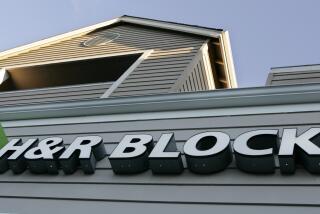Banking on the Return Business : Tax preparation: Burbank- based Triple Check and Jackson Hewitt are the other national chains behind H & R Block, and they’re battling to be No. 2.
- Share via
In the tax preparation business, thR Block Inc. and there’s everyone else. No tax service company comes close in size to Block, whose empire spans 9,000 offices worldwide.
But with this year’s April 15 tax-filing deadline only a week away, the only other two national chains are battling for the No. 2 spot in the market. Triple Check Income Tax Service Inc., based in Burbank, and Jackson Hewitt Inc., based in Virginia Beach, Va., are vying to be the Avis of tax services.
In the shadow of Kansas City, Mo.-based Block, whose company-owned and franchised offices are expected to generate more than $932 million in tax service revenue this year, Jackson Hewitt lays claim to the second spot because it has more offices--515 to Triple Check’s 350. (Like Block, Jackson Hewitt has company-owned and franchised outlets. Triple Check is entirely franchised.)
However, Triple Check claims second place because its system’s $25 million in revenue this year will surpass the $23 million projected for Jackson Hewitt by its founder and chairman, John T. Hewitt.
Either way, it’s an accomplishment that the two chains prosper at all in the face of Block’s dominance and the highly fragmented tax preparation business. They’ve done so not by trying to “out-Block Block,” as Triple Check President David W. Lieberman puts it, but by targeting niches of the market.
About half of the 106 million individual returns filed last year with the U. S. Internal Revenue Service were prepared by professionals. Indeed, H & R Block considers its biggest competitor to be “the individual at home doing his own return,” said the company’s chief executive, Thomas M. Bloch.
Thanks to the IRS’ Byzantine tax forms (see related story), Americans last year spent at least $4.7 billion in tax preparation fees. Block prepared 12.4 million returns, or about 20% of the professional market. That left both Triple Check (with 125,000 returns) and Jackson Hewitt (218,000) with less than 1% of the market.
Triple Check focuses on upper-income taxpayers--those with household incomes of $40,000 to $80,000 a year--and mainly advertises by word of mouth, Lieberman said. Jackson Hewitt goes after Block’s traditional base of middle- to low-income taxpayers but tries to draw clients with its emphasis on computerized preparation and filing services, which it advertises aggressively.
To grow, Triple Check and Jackson Hewitt must chase after new clients in an otherwise fragmented market. Excluding Block, there’s thousands of accountants, lawyers and financial planners that taxpayers can hire to fill out their returns. And persuading taxpayers to switch preparers isn’t easy.
“There’s a fierce loyalty among people to their current preparers,” said Richard Tyler, Triple Check’s vice president for marketing. Lieberman said, “Industrywide, there’s approximately an 80% retention rate of a client base.”
That’s a key reason why no other firms have been able to build national tax preparation chains in the 37 years since Block was founded, Tyler said. Past rivals “came in believing there was a huge market because everybody has to file a tax return,” he said, but “people don’t like to change.”
Triple Check tries “to convey a strong message of quality” to stand out, and expects most new clients “to come from referrals,” Lieberman said.
Jackson Hewitt, meanwhile, concentrates on advertising. “When you first go out and compete with the likes of Block, when 97% of the adult population knows what business they’re in, you have to spend some upfront dollars,” Hewitt said.
Their different niches are reflected in their fees. Jackson Hewitt, like Block, charges about $52 on average to prepare a federal return, many of which are the simple “short form” returns that don’t require the taxpayer to itemize deductions.
Triple Check’s average fee is $150--reflecting the added complexity of the itemized returns its clients typically file. Lieberman, 55, said the fee also reflects Triple Check’s exhaustive effort--which includes training for its preparers and elaborate work sheets tailored to specific occupations, even clergymen--to find every legal deduction for its clients. Of course, that’s a goal espoused by Block and every other tax service.
There are other differences. Jackson Hewitt, again like Block, is a big believer in the electronic filing of tax returns to the IRS. Triple Check is not.
The IRS has allowed electronic filing since 1986, and the process is generally credited with speeding up tax refunds to a couple of weeks from six to eight weeks for mailed returns. Most preparers charge extra to electronically file the return, but Jackson Hewitt does not. As a result, “over 90% of our returns will be filed electronically” this year, Hewitt said.
But Bloch contends that the growth of Jackson Hewitt and Triple Check is not coming at the expense of H & R Block, which typically charges an extra $25 for electronic filing. “The advent of electronic filing has stimulated the entire tax preparation industry,” Bloch said.
And if the taxpayer wants the refund in just a few days, Jackson Hewitt and Block will arrange “refund anticipation loans,” in which a bank immediately sends the refund amount to the taxpayer and is later reimbursed by the IRS. The fee for such loans can be another $30 to $50. Hewitt said 60% of his customers opt for the loans anyway.
But electronic filing and the quick-refund loans are anathema to Lieberman, who tells his preparers not to recommend the services to Triple Check’s customers. Why? He doesn’t think that the services, particularly the short-term loan, are worth the fees unless someone expects a refund totaling $3,000 or more.
“It’s strictly taking advantage of a person who can’t resist the temptation of getting the cash in their hands that little bit earlier,” Lieberman said. “Competitors say, ‘Our clients want it.’ Yes, people want cocaine, too. That doesn’t mean we hand it to them on a silver platter.”
Triple Check was started in 1941 but didn’t begin growing rapidly until 1969, when Lieberman, former tax manager at MCA Inc., and some associates bought the company for $500,000. Triple Check now operates in 42 states and expects to have 700 offices within five years. It also recently opened an office in London.
Lieberman also decided that to draw the upper-income clientele he wanted, he would grant franchises only to existing preparers who already had those taxpayers as customers, with the newly acquired franchisees adopting Triple Check’s system. Those customers would then refer Triple Check to others.
Hewitt started his firm in 1982 after spending 12 years with Block, where he rose to Northeast regional director. “But I just wasn’t proud of the service we were providing,” he recalled. “You were somewhat limited by the abilities of each individual preparer.”
He decided that his firm could prepare returns more efficiently and with fewer mistakes than Block by using a standard computer program that all of his preparers would employ. To this day, some Block offices don’t have computer programs for preparing returns, which makes the giant’s service uneven across the country, Block’s rivals contend.
“I concluded that if I could put together a system that did a higher-quality return at the same price as Block, it could be very lucrative,” Hewitt said.
Triple Check will post revenue of nearly $4 million this year, divided about equally between its tax franchise royalties and fees it collects as a dealer for mutual funds and other investments it offers. Jackson Hewitt’s revenue, also mostly from franchise payments, is expected to be $7.4 million this year, Hewitt said.
Although privately held, Jackson Hewitt published audited results for the year that ended April 30 that show a profit of $992,035, or a sizable 22% profit margin after taxes. The margins for publicly held Block, meanwhile, have hovered near 12% in recent years.
Triple Check said it is profitable but declined to release its numbers.
There’s no reason to think that both rivals won’t keep growing, given the confusing tax laws. Even a pro like Triple Check’s Lieberman can’t keep up with it. His offices look like a library, filled with volumes of hardcover books explaining federal and state tax codes.
Asked recently if he knew, say, IRS Form 4562 (a schedule for depreciating office goods), Lieberman replied that he did not.
Why? Because he doesn’t do his own return anymore. It’s handled by a Triple Check preparer.
Targeting Different Taxpayers
The three major tax-preparation chains each try to exploit a different segment of the market. Here’s an outline of their target customers:
H&R; Block -- Lower- to middle-income taxpayers with household incomes under $50,000 a year. Nearly half their clients file simple “short form” returns using standard deductions. Average fee: $52.
Jackson Hewitt -- Goes after H&R; Block’s market, except Jackson Hewitt tries to lure customers with computerized services and emphasis on electronic filing--at no extra cost--which speeds refunds from the Internal Revenue Service. Average fee: $52.
Triple Check -- Middle- to upper-income taxpayers with household incomes of $40,000 to $80,000 a year. Most clients itemize deductions, which Triple Check helps find through extensive worksheets. Average fee: $150.
Chasing the Tax-Return Market
H&R; Block Inc. dominates the tax-preparation business. But two other companies--Triple Check Income Tax Service Inc., based in Burbank, and Jackson Hewitt Inc.--also have a national presence and are fighting for the distant No. 2 spot. Here’s how all three rank in size.
Total Annual Total Offices in states revenue* Company offices California with offices (in millions) H&R; Block 9,000 605 50 $950 Triple Check 350 120 42 $ 25 Jackson Hewitt 515 57 27 $ 23
*1992 estimate from tax services only; includes company-operated and franchised offices
Source: Company and analyst reports
More to Read
Inside the business of entertainment
The Wide Shot brings you news, analysis and insights on everything from streaming wars to production — and what it all means for the future.
You may occasionally receive promotional content from the Los Angeles Times.









